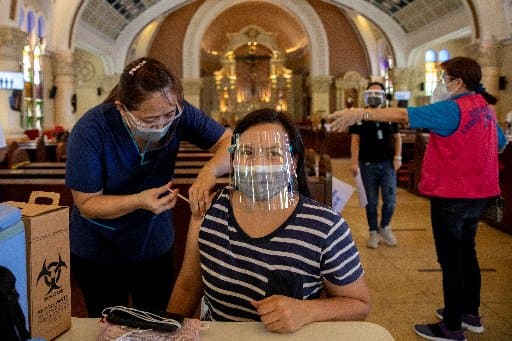WASHINGTON, D.C. — During the COVID-19 pandemic, religious groups have been big on vaccines: providing access, combating misinformation and insisting on equitable distribution.
Now, more than a year and a half into the pandemic, they are continuing this outreach while also taking a close look at how they can respond better to the vast needs the current public health crisis has exposed.
During a seminar of the Conference of the World Council of Religious Leaders on Faith and Diplomacy Oct. 4-7 in Lindau, Germany, the group was asked to consider if religious actors — leaders, institutions and organizations — are uniquely helpful in dealing with the COVID-19 pandemic.
At the start of this Oct. 6 session — which was more of a challenge to do better than a pat on the back — 67% of participants said they were “uniquely helpful” but by the end, after hearing ways religious groups had responded to the crisis and ways they could’ve upped their game, this number went down to 49%.
In other words, they see room for improvement.
Two days before, just after a session that examined the role of religious leaders in public health care in general, Azza Karam, secretary general for Religions for Peace, spoke to Catholic News Service from the conference and said the discussion affirmed that religious groups play a significant role because many of them run health care institutions and are already “serving communities every day and in times of crisis.”
Religious leaders also also addressing “massive numbers of people on a daily basis every day,” she noted, saying they impact people’s behavior and are also often connected with the politics in their country, which extends that reach even further.
“If you want to talk about delivering messages and canceling misinformation, we were right there with the biggest public pulpit,” she said of religious leaders of all faith traditions amid the pandemic. She also noted that some seminar participants owned up that their own faith groups also had been part of misinformation, particularly about the vaccine.
And now, as the pandemic lingers, she said religious groups have certainly been first responders but more individually. “Religious cooperation isn’t happening; they are all working, but not together,” she said.
And as she put it: “If not during pandemic, then when?” She stressed that more cooperation among religious groups is urgent right now.
Seminar participants asked themselves some of these hard questions too, noting that the pandemic laid bare not just health inequities but issues of mental health, with increased loneliness and even suicide, and a spike in domestic violence.
In the discussion, shown on livestream, one participant said religious groups should be better prepared to deal with these issues and to reach out to those better equipped, if necessary, as the pandemic continues.
But gaps worldwide on a collaborative faith response amid the pandemic doesn’t mean nothing is happening.
One interfaith effort has been the U.S. group Faith4Vaccines — about four dozen local and national groups of religious leaders and medical professionals including Catholic Charities USA and the Catholic Health Association — which has been primarily involved in getting houses of worship to promote vaccine distribution and faith leaders to combat vaccine hesitancy.
The Rev. Jim Wallis, an evangelical leader and one of the core leaders of the group, said the initial push to provide vaccine access and alleviate vaccine hesitancy worked well because faith leaders were trusted messengers.
The push now, he said, is global vaccinations and continued focus on poverty and inequities.
This August, Wallis, founder of the Christian social justice organization Sojourners, joined Georgetown University’s McCourt School as the inaugural chair of the university’s Center on Faith and Justice.
“COVID was revelatory,” he said, laying bare, among other things, lack of proper access to health care for everyone.
As a means to regroup now, he said would like Faith4Vaccines to host a listening session with clergy members, pastors and rabbis involved on the ground level with vaccine promotion to talk about what they learned “to help us in our way forward.”
Don McCrabb, executive director of the U.S. States Catholic Mission Association, and Mary Beth Powers, president and CEO of the Catholic Medical Mission Board, also have been involved in vaccine equity, distribution and clearing up vaccine misinformation through their own work and as part of Catholic Cares Coalition, a group of about 60 U.S. Catholic organizations formed in the pandemic.
McCrabb told CNS the coalition has worked with members of other faith traditions, particularly for an interfaith prayer vigil on vaccine equity this summer and in advocacy work. Local efforts have included a vaccine clinic in Chicago and working with other faith groups to get vaccines to farmers in Texas.
Some of the challenge for the group has been close to home in encouraging Catholics to be vaccinated, although he said close to 80% of Catholics in the U.S. are now vaccinated.
Powers said the Catholic Medical Mission Board has been involved in getting countries where it serves ready for the vaccine; some areas just received the first round of vaccines this summer.
The group has particularly been involved with local faith leaders, even providing a sermon guide for them that emphasized how getting vaccinated is an act of love and charity and a way to take care of each other.
She said the Catholic Cares Coalition and other faith groups got that message out through trusted voices but she thinks this needed to happen more globally.
The pandemic has been an example of how “we didn’t take care of each other very well,” Powers said, from her New York office.
And now, with families pushed further into poverty, she thinks there should be a reckoning of the world’s response to this global health challenge to “see what we could’ve done better.”












